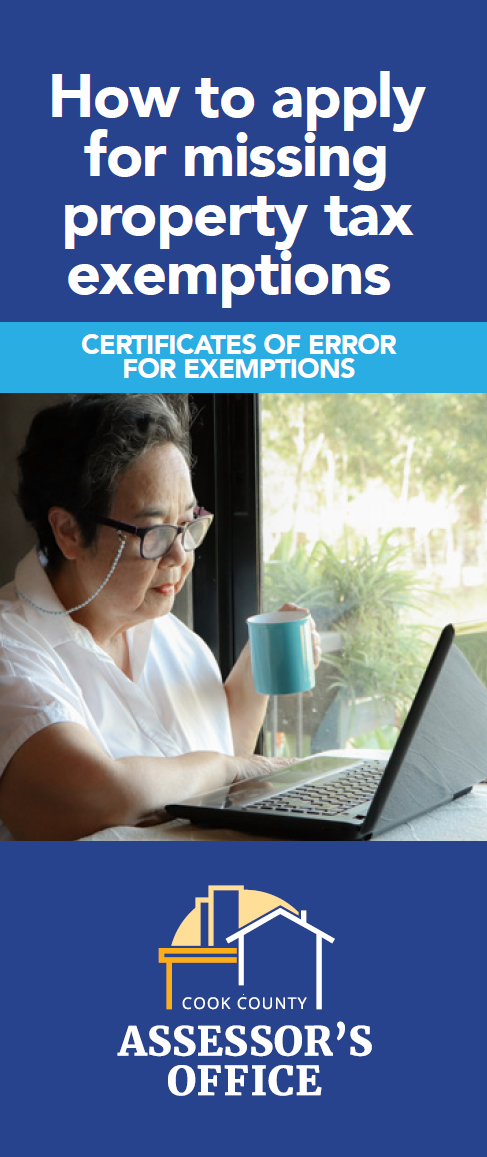I received the Senior Exemption on my tax bill last year. Do I have to reapply for the Senior Exemption this year?
No. Senior exemptions renew automatically, meaning you only have to apply once. If you received a Senior Exemption on the second-installment tax bill you received in July 2021, you do not have to reapply for this exemption.
I qualified for a Senior Exemption. Do I have to apply for a Homeowner Exemption separately?
No. Seniors receiving the Senior Exemption automatically qualify for the Homeowner Exemption and do not have to apply for it separately.
How are Senior Exemption savings calculated?
The Senior Exemption reduces the Equalized Assessed Value (EAV) of a property by $8,000. EAV is the partial value of a property used to calculate tax bills. It is important to note that the exemption amount is not the dollar amount by which a tax bill is lowered. Your property tax savings from the Senior Exemption is calculated by multiplying the Senior Exemption savings amount ($8,000) by your local tax rate.
Your local tax rate is determined each year by the Cook County Clerk and can be found on your second-installment tax bill or by contacting the Cook County Clerk’s Office at 312-603-6566.
Please see the example below.
| $100,000 |
2021 Estimated Fair Market Value |
| X.10 |
Assessment Level (10% for residential properties) |
| $10,000 |
2021 Assessed Value |
| X 2.916 |
2021 State Equalizer |
| $29,160 |
2021 Equalized Assessed Value (EAV) |
| -$8,000 |
2021 Senior Exemption |
| $21,160 |
2021 Adjusted Equalized Assessed Value |
| X.08 |
2021 Tax Rate (example; your tax rate could vary) |
| $1,692.80 |
Estimated Tax Bill in dollar amount |
Are there other property tax savings available to seniors?
The Cook County Assessor's Office also administers the Senior Freeze Exemption.
The Cook County Treasurer's Office offers a Senior Citizen's Tax Deferral program, please contact their office at (312) 443-5100.
What if I own a cooperative?
Owners of cooperative apartments must also submit a stock certificate, occupancy agreement, or trust agreement, along with their applications.
I would like to apply by mail. Is there anything I should know?
If you apply by mail, do not send originals of the above documents. Please send copies because the documents cannot be returned to you.
What happens after I have filed for a Senior Exemption?
The Assessor's Office will notify you when your application is approved.
Can I still receive the Senior Exemption if my property is listed in the name of my late spouse?
If you are 65 or over, you will qualify for this exemption in your name and can apply online. Otherwise, your property will receive the exemption for the remainder of the year of your spouse's death. You will then have to apply when you turn 65.
My parent passed away in 2021, is the property still eligible for the Senior Exemption?
Yes, as long as your parent was alive and resided in the home on January 1, 2021, and used the home as their principal place of residence, the property would be eligible. Follow the instructions listed below.
- Sign your parent’s name on the application and in parenthesis write deceased and Underneath it write your name and in parenthesis write son/daughter.
- Provide a copy of the death certificate.
- Submit a copy of their driver’s license or state ID along with a copy of your driver’s license or state ID.
- Provide letters of office, successor trustee paperwork, or power of attorney paperwork, if applicable.
How do I apply for prior tax years?
If you were eligible for the exemption in a prior Tax Year but the exemption was not on your bill, you can apply for a refund or corrected bill by filing for a certificate of error. Learn more here.
• A complete application requires supporting documents (listed above) and your home's PIN. How do I find my PIN?
• Avoid these common application errors in your application.


